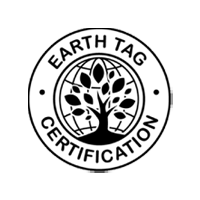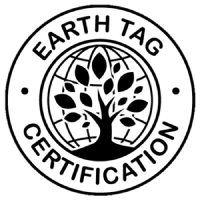
Frequent Asked Questions (FAQ)*Organic Certification
- What certifications does Earth Tag Organic offer?
Earth Tag Organic offers certifications for organic farming as well as for processing.
Additionally, Earth Tag provides certification services for Eco Nursery and Eco-care Potted Plant. - What are the requirements to apply for Earth Tag Organic certification?
To apply for Earth Tag Organic certification, the following conditions must be met:
1. Legal land use, with proof.
2. Operations must be conducted organically (including no use of chemical fertilizers, pesticides, or genetically modified materials for at least 6 months).
3. Ability to maintain records.
4. If there are conventional farms (using fertilizers and chemical pesticides) nearby, sufficient isolation and buffer zones must be established.
*Before certification, a professional will assess the site to determine if it meets the certification requirements.
*For more details on certification requirements, refer to the Earth Tag Organic Standards. - What documents are required to apply for Earth Tag Organic certification?
To apply for Earth Tag Organic certification, the following documents must be prepared and provided during the inspection:
~ Receipts for all purchased materials and seeds.
~ Records of planting, harvesting, and sales.
~ Records of materials used (including fertilizers and other inputs).
~ If there are in-house making materials, records of their production must be provided.
*The certification body will provide forms as reference for the above records. - How long does it take to apply for organic certification?
We conduct certification inspections twice a year, depending on when a complete application and documents are received:
~July Inspection: Applicants must submit their application between November 1 and April 30 of the following year. Applications submitted after April 30 will be postponed to the next quarter’s inspection.
~December Inspection: Applicants must submit their application between May 1 and September 30. Applications submitted after October 30 will be postponed to the next quarter’s inspection. - What is the process for applying for Earth Tag Organic certification?
1. Submit the application form.
2. The coordinator will contact the applicant by phone for initial communication.
3. Earth Tag advisor will conduct a pre-audit at the site. This step is free and aims to confirm the application details and ensure basic eligibility for organic certification.
4. Once eligibility is confirmed, the applicant must sign a contract and pay the certification and administrative fees.
Based on the submission date, the audit will be scheduled for a specific quarter and time. - What is the cost of organic certification?
A fixed administrative and certification fee of RM1500 will be charged.
Additional charges for travel expenses, toll fees, and accommodation will apply based on the location.
Additionally, soil, water, and crop samples will be sent to an international laboratory for testing, with separate fees for this service.
For more detailed information, please contact the Earth Tag certification authority. - If the certification is not granted, will the fees be refunded?
The application fee and inspection fee are non-refundable. - After obtaining certification, can I print the Earth Tag label on my vegetables?
The certification logo (Logo) cannot be printed on vegetable packaging by the applicant themselves, as its use is strictly regulated.
We will provide the certification logo and assign a unique serial number for each logo.
Before use, the applicant must thoroughly understand and comply with the regulations regarding the use of the logo. - Is regular reinspection required after obtaining organic certification?
Yes, organic certification typically requires annual reinspection to ensure continued compliance with organic standards. This includes submitting annual update documents (reassessing the application), on-site inspections, and sampling for testing and analysis. - What is the validity period of organic certification?
The validity period of an organic certification certificate is 3 years. However, every year, certified applicants must undergo an annual inspection and submit payment to maintain the validity of their certification. - I have chickens and produce honey. Can I apply for Earth Tag Organic certification?
Apologies, but currently, Earth Tag Organic certification is limited to agricultural products and their processing and packaging services. It does not cover organic certification for poultry, meat, honey, or similar products. - Can I sell crops grown in my garden as organic if they are not listed on the certificate?
No, it is not allowed. According to organic certification regulations, only crops listed within the certification scope and mentioned on the certificate can be sold under the organic label. Crops not included in the certificate, even if grown on a certified farm, cannot be labeled as organic for sale. If you wish to sell such products under the organic label, you must fill out the “Change Form” and apply to the certification authority. - Do I need to submit soil and irrigation water test reports before applying for organic certification?
Applicants can first submit a test report for preliminary evaluation to determine if the standards are met. On the day of the inspection, the auditor will also collect soil and water samples on-site for testing. - After obtaining organic certification, will any organizations or groups come to purchase our organic vegetables?
Earth Tag Organic only provides third-party certification services and does not offer services related to providing sales channels for applicants. - Can “organic fertilizers” or materials labeled as “suitable for use in organic farming” be used on organic farms?
Fertilizers or pesticides labeled as “organic” may contain some ingredients that are not suitable for organic farming. Therefore, applicants are advised to confirm the composition of fertilizers and pesticides with the certification authority before purchasing to ensure they meet organic standards and do not cause contamination to the organic farm. - What is the difference between “organic” and “organic in-conversion” fruits and vegetables certified by Earth Tag Organic seen in the market?
Both “organic” and “organic in-conversion” crops are grown using organic methods and have undergone soil, water, and crop testing to meet the standards, ensuring the same level of safety. However, some farms undergo a transition period when converting to organic farming, during which the soil and natural environment are being restored. This is why a conversion period standard is established. The typical covnersion period ranges from 2 years for short-term crops to 3 years for long-term crops. - If I see crops in the market claiming to be organic but without certification, can I report them to the certification authority?
Since the Malaysian government has not yet established relevant regulations to control local organic products, products labeled as “organic” in the Malaysian market do not violate organic laws. However, products that have not undergone third-party certification cannot be guaranteed to truly meet organic standards.
If a store sells organic vegetables that are not from “Earth Tag Organic certified farms” or if the certification has been terminated, yet the store continues to sell them under the “Earth Tag Organic” label, it would be in violation of the “Earth Tag Organic Certification Regulations.” If such cases are discovered, please feel free to contact us by phone or email. We will collect the relevant information and take necessary actions. - If my vegetables have a pesticide residue test report showing no pesticide residue, can they be considered organic?
A pesticide residue test report showing no pesticide residues is not sufficient to prove that vegetables meet organic standards, as some pesticides may have strong degradation properties and could be difficult to detect in testing. Organic certification is a system-based certification, not a single-product certification. To be considered organic, vegetables must meet specific organic farming standards and undergo third-party certification. - Can hydroponics and aquaponics apply for Earth Tag Organic certification?
According to the Earth Tag Organic Standards, farming must be done directly in the soil to align with the organic principles of IFOAM (International Federation of Organic Agriculture Movements). Hydroponics and aquaponics do not meet this principle.
IFOAM’s organic principles emphasize that agricultural systems should be ecologically based, focusing on soil health, the sustainable use of natural resources, and biodiversity. IFOAM believes organic farming should follow natural laws, relying on the vitality of the soil and organic matter within the soil to provide nutrients for crops, rather than depending on chemically synthesized fertilizers and pesticides.


